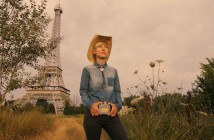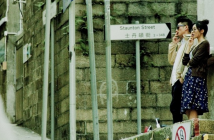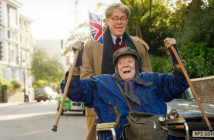
Cast: Marek Walczewski, Izabella Olszewska, Ewa Zietek
Director: Andrzej Wajda
Country: Poland
Genre: Drama
Editor’s Notes: The following review is part of our coverage for Martin Scorsese Presents: Masterpieces of Polish Cinema which runs from February 5th to 16th. For more information on this film series visit filmlinc.com and follow The Film Society of Lincoln Center on Twitter @FilmLinc.
Something kept nagging at me when I was watching Andrzej Wajda’s The Wedding. It wasn’t anything bad, mind you. There was something ticking in the back of my head. The way Wajda had interpreted Stanislaw Wyspianski’s play on screen had me scratching my head. The play itself is an astounding piece of work . In the play, Wyspianski takes his attendance of a poet friend’s wedding and makes them a boiler pot for political and ideological dialogues. In watching it, I remembered one of my favourite films in Italian cinema, And The Ship Sails On (1983) by Federico Fellini.
Witold Sobocinski’s cinematography brings the characters’ interior regrets to life through an unusual atmospheric lens.
The Fellini film is noted for its integration of different class structures and political ideals mixing within a Titanic-like ship, the Gloria N., which sets sail off the coast of Naples. All sorts of surreal images and beautiful prose erupt in the scenes of the ship. At the very end, a reverse tracking shot reveals the film set, the director, and a rhinoceros on a boat being rowed by Orlando, an Italian journalist that breaks the fourth wall with his commentary.
 In The Wedding a poet marries a peasant girl in turn of the century Kraków. The celebrations move from the street to a little house in the mist of the dark woods. Festivities are cramped, but the party continues on, swirling in a feverish fervor of dance and happiness. Among the guests are intellectuals, locals, painters, and traditional musicians that provide the score from within. As per the play, the film moves from actual to dreamlike inside and outside of the home. Conversations become strained or overly dramatic to the point of poetry (similarly, Fellini uses this technique of musicians and elaborate costumes as the set for his eccentric characters). The eloquence of the thinkers is often interrupted by the dialect of the locals (most likely the family of the bride), in a cross of drunken joy and bitter resentment of Poland’s 100 year-old occupational struggles with Russia, Prussia, and Austria. A poor man addresses the camera and comments on the environment within from the outside. Soon, he too becomes part of the whirlpool mixture in the house.
In The Wedding a poet marries a peasant girl in turn of the century Kraków. The celebrations move from the street to a little house in the mist of the dark woods. Festivities are cramped, but the party continues on, swirling in a feverish fervor of dance and happiness. Among the guests are intellectuals, locals, painters, and traditional musicians that provide the score from within. As per the play, the film moves from actual to dreamlike inside and outside of the home. Conversations become strained or overly dramatic to the point of poetry (similarly, Fellini uses this technique of musicians and elaborate costumes as the set for his eccentric characters). The eloquence of the thinkers is often interrupted by the dialect of the locals (most likely the family of the bride), in a cross of drunken joy and bitter resentment of Poland’s 100 year-old occupational struggles with Russia, Prussia, and Austria. A poor man addresses the camera and comments on the environment within from the outside. Soon, he too becomes part of the whirlpool mixture in the house.
Witold Sobocinski’s cinematography brings the characters’ interior regrets to life through an unusual atmospheric lens. The colours are reminiscent of Pieter Bruegel paintings and shots vary from claustrophobic dervish shots to calm stills of the fog outside. At times the disjointed views in frames can be jarring, but they’re symptomatic of the booze-fueled stupor in the air. The details in Wajda’s direction are intricate revealing a filigree of cultural diaspora and an acerbic commentary of the director’s own experiences with Polish history.
Wadja is one of many directors, along with Fellini, Martin Scorsese, and those like them, who tackle the directorial dream film: they are aware that cinema is a way of portraying the mind, especially the director’s.
Wadja is one of many directors, along with Fellini, Martin Scorsese, and those like them, who tackle the directorial dream film: they are aware that cinema is a way of portraying the mind, especially the director’s. In The Wedding, Wadja utilizes Wyspianski’s play as a vessel for his thoughts on the present. Poland is country that has continually wanted change and struggled to control their cultural independence and identity.
At the peak of the party, the bride and groom call forth the spirit of the straw men that surround the house and invite them in. They invite nature and all its mysteries to disrupt and display. As it all winds down, the bridegroom’s father envisions an uprising and makes a real life call to arms in his delusion. The party follows, a young fallen hero loses the golden horn he has been entrusted with, and the magical party goes from a thrilling merry go round to a coven of lost ghosts in the obscured mists.
The Wedding is an enigmatic meditation on Polish historical narratives. Without knowing much about Poland and its complex timelines, the film is a quirky visual feast. It provokes an outsider to find out more about the settings it portrays. The film is a provocative work of fiction that illuminates the mirrored real life of its characters from the mind of its artists and in that, it is timeless.
[notification type=”star”]92/100 ~ AMAZING. The Wedding is an enigmatic meditation on Polish historical narratives. Without knowing much about Poland and its complex timelines, the film is a quirky visual feast. It provokes an outsider to find out more about the settings it portrays. [/notification]



